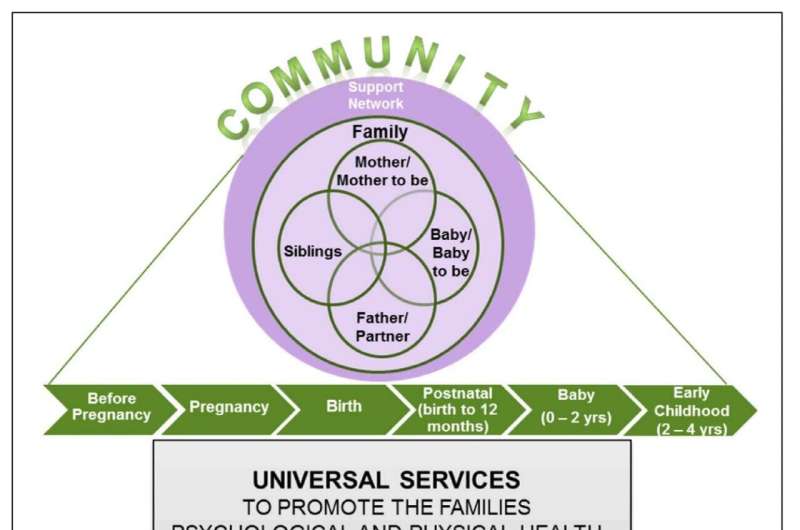This article has been reviewed according to Science X's editorial process and policies. Editors have highlighted the following attributes while ensuring the content's credibility:
fact-checked
proofread
Austria has catching up to do in prevention and care of mental illness during the first year after pregnancy

The Austrian Institute for Health Technology Assessment (AIHTA) has analyzed international care models and pathways as well as the situation in Austria with regard to perinatal mental health. The two reports published are part of a project by the Austrian Science Fund (FWF) to improve perinatal mental health in Tyrol, which is led by the Medical University of Innsbruck.
"The international comparison showed how important an integrated overall concept for prevention, early detection and treatment is. However, the Austrian care structure deviates considerably from the international recommendations," says Ingrid Zechmeister-Koss, deputy director of the AIHTA.
Mental illness in parents is a frequent and serious complication in the perinatal phase, i.e. the time during pregnancy and the first year after birth. As many as one in five women and one in ten men suffer from mental health problems such as depression or anxiety disorders during this period.
Despite the immediate and long-term potentially serious effects on mother, father and especially the child, ranging from behavioral problems to an increased risk of suicide and accompanied by great burdens in the health, social and educational systems, there is so far neither a national strategy nor a national care model for perinatal mental health in Austria. The existing offers show great regional differences, which are often uncoordinated and not available across the provinces.
AIHTA has now taken the lead in two research reports to analyze how other countries deal with this need for care structures and to examine the characteristics and capacities of Austrian services. For the first report, six documents from the UK, Ireland, Canada and Australia, produced by multi-professional working groups, experts and stakeholders, were analyzed.
All documents contained information on different aspects of care, including primary prevention, screening, diagnosis, referral and treatment.
"A key finding is that for integrated care models, in which different service providers and professional groups work together continuously and in a structured way throughout the entire treatment and care process, clearly defined pathways and stepped care concepts for the organization and provision of perinatal mental health services are necessary," explains Inanna Reinsperger, public health researcher at AIHTA.
Prevention and screening
As part of primary prevention, expectant parents should be educated about mental health in general and possible mental health problems during pregnancy and after birth. For women with pre-existing or previous mental health problems or an increased risk of mental illness, counseling before pregnancy is also recommended.
All documents identify early identification of people with perinatal mental illness as essential. "Screening mothers for these disorders is unanimously recommended, ideally at several points in time, for example at the beginning and later in pregnancy as well as 6-12 weeks after birth or at least once in the first year after birth," Reinsperger emphasizes.
The situation in Austria, however, deviates significantly from this recommendation: In the "Mother-Child Health Passport," the national screening program for pregnancy and the first five years of the child's life, routine screening for mental health problems is not yet provided for, although mental health components are to be integrated in the future.
"For serious, especially acute perinatal mental health problems, there are generally few specialized services," explains Zechmeister-Koss. National programs such as "Frühe Hilfen" (The Austrian Early Childhood Intervention Program) assess mental health problems and provide psychotherapeutic group services of limited capacity in Vienna and Tyrol, but they are not specifically geared towards mental problems.
Lack of research in Austria
In addition to an evidence-based and needs-oriented approach, an ideal model should include primary prevention, counseling and early detection measures, have clear referral pathways and take into account the mental health of both parents and the child. However, the mapping of existing prevention, early detection and care services in Austria shows that the content and capacity of these services vary widely and that no national quality standards and guidelines on care pathways exist.
Moreover, the inpatient capacities for mother-child beds are clearly below the internationally recommended capacities and are completely lacking in some provinces.
"For some services in Austria, it is unclear to what extent their benefits have been proven. There is also virtually no knowledge about their cost-effectiveness or the impact of structural determinants for mental health, such as family and reproduction policy measures. In contrast to other countries, there is a lack of research on this in Austria. Supporting parents with perinatal mental health problems has a low health and socio-political priority despite its frequency," says project leader Jean Paul from the Medical University of Innsbruck.
According to the experts, stronger coordination and cooperation between different sectors—such as the health and social sectors—would ultimately be essential throughout Austria for the implementation and realization of perinatal mental health care models. This requires a national strategy and the definition of responsibilities.
Furthermore, the AIHTA recommends a national guideline for the definition of care pathways, for example after a mental health problem is identified. In addition, data from the national birth register should be expanded with those on mental health and should also be available for research.
"On the basis of these findings, experts from all the professions involved, such as psychiatrists, midwives, gynecologists, pediatricians, psychologists and representatives of the administration, together with affected mothers and fathers in Tyrol, will prioritize approaches for improvement and then implement them alongside thorough scientific evaluation," summarize the study authors.
More information: Perinatal and infant mental health care models and pathways: eprints.aihta.at/1420/
Perinatal and infant mental health care in Austria: A mapping of existing prevention, screening and care structures, with a specific focus on Tyrol: eprints.aihta.at/1437/




















